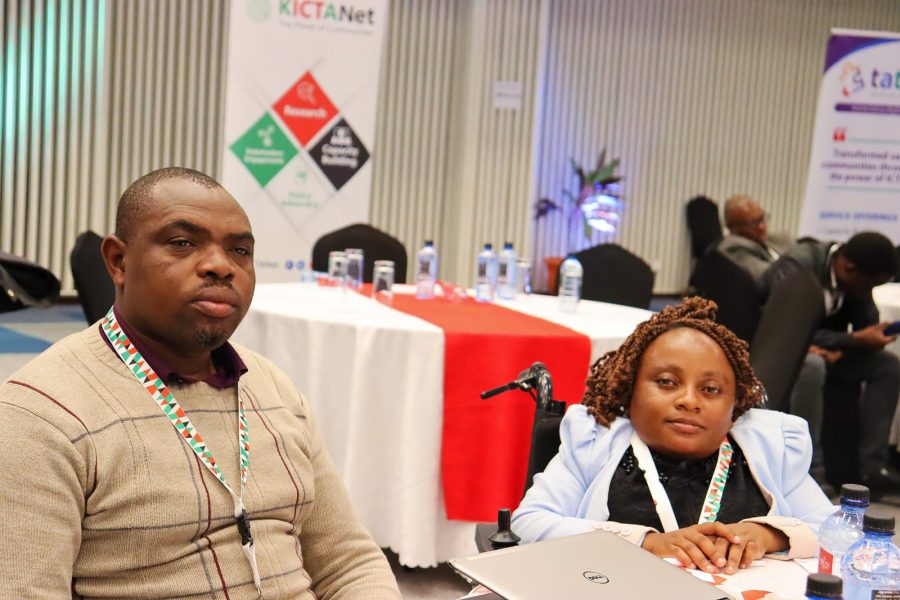The just concluded Kenya Internet Governance Forum 2024 (KIGF) was truly inspiring! It reflected the dedicated effort of KICTANet, and its Disability Program to advocate for the inclusion of persons with disabilities (PWDs) in various internet forums and platforms. (Note: only 3% of the Internet is accessible, and Kenya is no exception in the accessibility of its public websites.)
As I reflect on the success of the KIGF, I can’t help but celebrate the incredible steps taken towards inclusivity. While I could explore various perspectives, such as the involvement of children in the Kenya Children IGF or the inclusion of the youth in the Kenya Youth IGF, I am particularly moved by the efforts to include persons with disabilities in the KIGF.
The commitment to inclusivity calls for going beyond the participation of minority groups; to encompass the essential work needed to ensure active involvement of everyone. After all, the call for accessibility isn’t just for PWDs; it’s for the comfort and inclusion of all, including the elderly, individuals with chronic illnesses, and anyone else who may benefit from accessible services at a conference.
It’s essential to recognize the meticulous planning and efforts of KICTANet’s KIGF multistakeholder advisory group (MAG) to ensure accessibility. By aligning their planning with the provisions of the IGF’s Dynamic Coalition on Accessibility and Disability (DCAD) guidelines, they demonstrated a clear intent to eliminate barriers and enhance the accessibility of the Internet forum.
Over the years, DCAD has worked to promote participation and ensure accessibility of the global IGF and other internet forums to persons with disabilities. As a member of this Dynamic Coalition and the KIGF MAG member, I have been able to link up the two entities by drawing the best practices from DCAD due to my beneficiary status of the DCAD Travel to IGF 2023 Fellowship program, my role as a member of the Internet Society ASG Executive Committee, and as a special committee member revising the dynamic coalition’s IGF Accessibility Guidelines.
From the outset of the forum, there was a proactive involvement of persons with disabilities in the multistakeholder advisory group (MAG) which included the KICTANet Disability team. This ensured that every aspect of the forum was as inclusive and accessible as possible. For example, a round table room arrangement format was adopted for ease of navigation and to ensure enough legroom room for participants. Further, the Deaf participants were reserved tables in the front rows so that they could easily see the speakers and engage the sign language interpreters. It was heartening, during MAG meetings, to hear the chairperson consistently inquire whether activities were truly inclusive and accessible.
The use of Eventbrite for registration, coupled with swift issue resolution, demonstrated a keen focus on attendee experience. Even when the need arose to postpone the forum due to the then #RejectFinanceBill demonstrations, prompt communication ensured that everyone stayed informed. Timely updates were shared on all digital platforms including the KICTANet website, WhatsApp Channel, X, TikTok and others.
The attention to physical accessibility was evident as well, with a reconnaissance team visiting the venue to assess and optimize physical accessibility, including room arrangements, ambient sound systems, accessible dining areas, and restrooms.
On the day of the forum, the commitment to inclusion was undeniable. Volunteers were strategically assigned roles to assist all participants and were briefed on best practices, especially for those with disabilities. The specific needs of the Deaf attendees, who formed the majority of PWDs at the forum, were thoughtfully addressed, with services including sign language interpretation and multiple screens for clear presentations and seamless online participation.
This gradual and steady increase in engagement of PWDs in KIGF from as far back as 2019, is an attestation of a journey toward making a real difference—an embodiment of this year’s theme of ‘Building Kenya’s Multi-Stakeholder Digital Future‘.
Looking Ahead
Looking ahead, there’s an exciting prospect for future Internet Governance Forums. With the growing demand for inclusion and a deliberate effort to collaborate directly with PWDs, I envision forums that can accommodate diverse individuals with disabilities. I foresee a future where artificial intelligence and other emerging technologies will shatter inclusion and accessibility barriers. From flawless captioning and audio descriptions to the elimination of background noise, technology will play a pivotal role in creating truly inclusive spaces.
While local guidelines like provisions for ramp inclinations may be lacking, we can adopt recommendations from the IGF to ensure that physical spaces are universally accessible. Better signage and clearer directions can further enhance the overall experience for all participants.
Ultimately, I wish to repeat that the provision of accessibility and accommodations in forums is not merely a privilege for PWDs; it’s a necessity and a fundamental right. By ensuring the full and active participation of persons with disabilities, we are not only reaching our target audience but also creating a space that can benefit the elderly, individuals with chronic diseases, expectant mothers, and anyone else in need of accommodations for seamless participation.
The Kenya Internet Governance Forum 2024 was a testament to what is possible when inclusivity is prioritized. I am thrilled by the progress made this year compared to the previous years and eagerly anticipate even more inclusive and accessible forums in the future. Together, we are truly building a future where everyone is welcomed and included.
Nicodemus Nyakundi is a Digital Accessibility for PWDs Program Officer at KICTANet. He has a background in IT and advocates for the digital inclusion of persons with disabilities.
![]()




